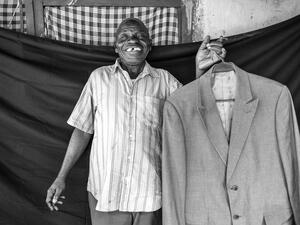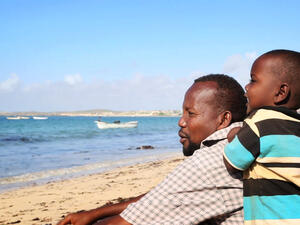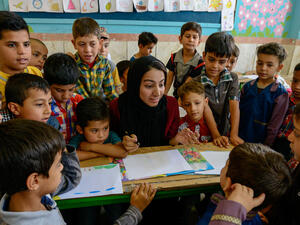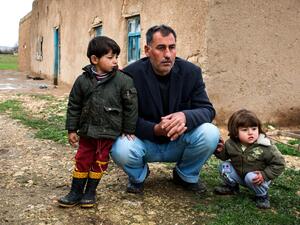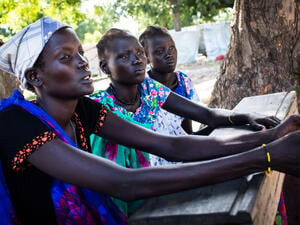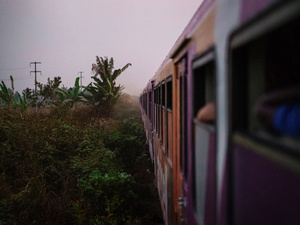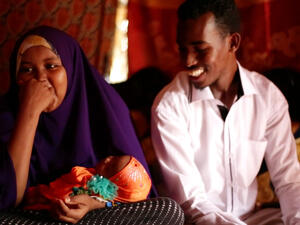Small groups of Ivorian refugees returning home, says UNHCR
Small groups of Ivorian refugees returning home, says UNHCR
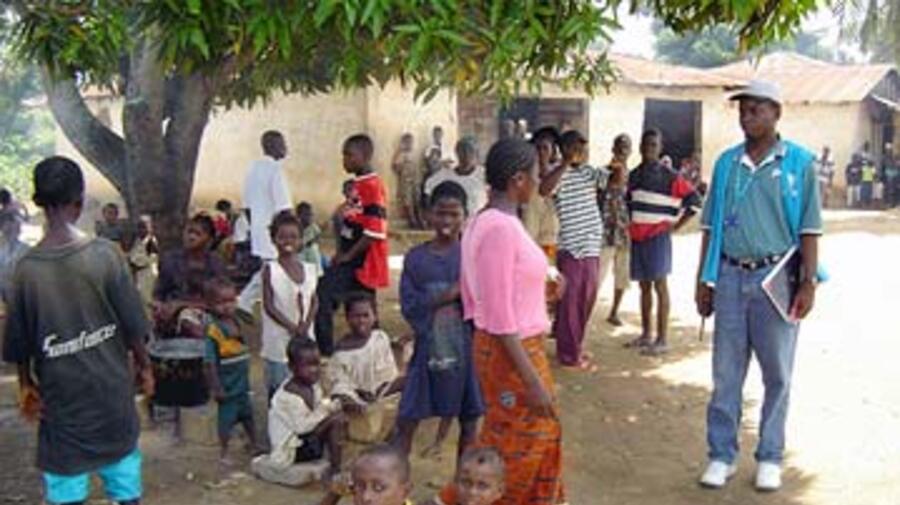
Ivorian refugees live among the Liberian population in Butuo, north-eastern Liberia.
BUTUO, Liberia, Nov 29 (UNHCR) - Small numbers of Ivorian refugees in Liberia have been returning home as tensions ease in Côte d'Ivoire. While the influx into Liberia has ground to a halt, the UN refugee agency and its partners continue to monitor and to provide assistance in the border areas.
No new arrivals from Côte d'Ivoire were reported over the weekend in Nimba county, north-eastern Liberia, where UNHCR and the Liberian National Red Cross Society (LNRCS) have so far registered 10,045 Ivorian refugees in and around the towns of Butuo and Gporplay. The refugees started fleeing their homes in early November, fearing renewed fighting between Ivorian government troops and rebels.
Today, the Cestos river that divides the two West African countries is no longer bustling with canoes carrying Ivorian refugees to Liberia. Instead, the population movement has been reversed, with small groups of refugees crossing back to their villages in Côte d'Ivoire.
"The situation in Côte d'Ivoire is improving and my people can come back without any fear," said Labeh Tion, an official working for the municipality of Zouan-Hounien in western Côte d'Ivoire. He was in Butuo with a delegation from his municipality to inform their compatriots that the gunfire had stopped.
"Although the situation seems to have come back to normal, UNHCR will continue to watch the situation very carefully and be prepared in the event of any inflow of refugees again from Côte d'Ivoire," said Moses Okello, the UNHCR Representative in Liberia. "UNHCR is working with the government to strengthen immigration presence in Nimba, Grand Gedeh and Maryland counties."
Jean Serakounne is among some of the recent arrivals living in UNHCR's transit centre in Butuo. She had sought refuge in Liberia once before - when the Ivorian conflict first broke out in September 2002 - and lost her father when he fell off an overcrowded canoe and drowned.
Serakounne eventually returned to her village in Zouan-Hounien and volunteered at an orphanage centre run by a Catholic mission until she was forced to flee again recently. "When we heard gunfire, everybody evacuated the centre and I came with some of the children," she said. She is now taking care of three children.
Like her compatriots, Serakounne monitors the situation in Côte d'Ivoire through the radio and by asking UNHCR staff. She is aware that life is slowly normalising in her country and hopes to resume her work at the orphanage centre very soon.
In the meantime, the Ivorian refugees are integrating well in their Liberian host communities. It is common to see refugees and their local hosts carrying agriculture tools along the roads early in the morning to work the farms side by side. Refugee women look after Liberian babies and help in the domestic work of the other women in the villages.
"Africans are the same people and the Ivorians helped us during the height of the Liberian crisis. Now it is our turn," said Albert Fanga, the Superintendent of Butuo.
With the support of the Liberian government, UN agencies are continuing to provide assistance along the border. One of the paramount priorities is the reconditioning of the roads to allow trucks to reach remote areas and deliver World Food Programme food and UNHCR relief items like blankets, soap and kitchen sets. UNHCR's implementing partner, LUSH (Liberians United to Save Humanity), has started to repair some of the bridges to make them passable in a very short time. But the lack of adequate equipment in the country makes the rehabilitation process difficult.
Despite the poor road conditions, UNHCR staff based in Saclepea town make daily visits to the remote villages and possible entry points along the 45-km border, often taking narrow roads to the middle of the jungle.
"Conducting regular meetings with refugee communities is essential to inform them about the assistance that we can provide and to gather accurate information about their background and future hopes," said Fidelis Swai, who heads UNHCR's office in Saclepea.
Mobile clinics run by the agency's health partners carry emergency kits north and south of Butuo. UNHCR has also provided motorbikes to help LNRCS staff reach remote places to collect information on the numbers and conditions of the recent arrivals. Fortunately, only a few cases of malaria and diarrhoea have so far been reported.
UNHCR is planning to implement community empowerment projects - especially in the health, water and sanitation sectors - in order to assist the affected Liberian communities with the refugee burden and to prepare for potential future population movements.
By Francesca Fontanini in Butuo, Liberia



